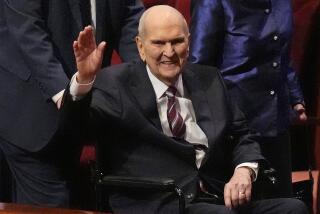Cites Mainstream Protestant Membership Decline : Pastors Need Humility, Schuller Advises
- Share via
NASHVILLE, Tenn. — It may be unusual for the apostle of self-esteem, the Rev. Robert Schuller, to suggest that more humility is in order, but that is just what he advocates for the heads of the membership-losing mainstream Protestant denominations.
“I haven’t heard any mainline leaders say we’re doing something wrong. They don’t do it. They don’t have the humility,” Schuller said in an interview last week at the United Methodist Congress on Evangelism.
The California pastor, whose 10,000-member Crystal Cathedral in Garden Grove is part of the Reformed Church in America, addressed the congress and also spoke last summer to a national Methodist men’s organization.
Share in Decline
The Methodists and the Reformed Church have shared in the general membership decline of the liberal-to-moderate church bodies since the 1960s. Nine selected U.S. mainstream denominations dropped a combined 0.77% in membership from 1983 to 1984, according to data released this month by the National Council of Churches. (The researchers used 1983 figures for the United Methodist Church, however, since the 1984 figure--showing another drop--was not available to them.)
Schuller said he is “desperately” concerned about increasingly empty churches.
“You can shoot a cannon through them and not hurt anyone,” he said. “Billions of dollars are tied up in costly real estate in major cities. It’s a terrible waste of money.”
To illustrate his point about the absence of humility among mainstream church leaders, Schuller said their seminaries “don’t invite in successful pastors to see how they do it.”
Advice on Sermons
He also believes that ministers should quit talking about social ethics in Sunday services and instead address psychological hurts and needs. The place for ethical discussions is “in the classroom where there can be dialogue,” Schuller said.
Schuller’s advice contrasts with a central United Methodist tenet to preach both on social justice matters and faith’s responses to personal problems.
“If (the Methodists) are going to stem the tide, they’re going to have to speak to the fears and needs of people in the pews,” Schuller said. “I’m sure of one thing, church growth cannot succeed using the ethical approach.”
Schuller’s latest book, “The Be-Happy Attitudes” (Word) has been No. 1 on the Advice/How-to New York Times Best-Seller list in recent weeks and his televised services are among the most-watched religious programs. His sermons stress “possibility thinking,” a variation on the “positive thinking” appeal of retired New York pastor Norman Vincent Peale.
Appeal to the Tentative
Schuller’s congregation has always emphasized an appeal to non-churchgoers (through such stratagems as a drive-in section for tentative worshipers) and people who have minimal knowledge of the Bible and Christian tradition.
In keeping with this, Schuller cautioned against sermons laden with scriptural references--advice that runs counter to some Methodist thinking. Evangelical Methodists in particular have called for more biblical sermons to wake up listless congregations.
He said consistency in avoiding provocative subjects is also essential for sermons.
Without consistency in the message, “there is a confusion of expectations . . . a breakdown of loyalties,” he said.
More to Read
Sign up for Essential California
The most important California stories and recommendations in your inbox every morning.
You may occasionally receive promotional content from the Los Angeles Times.













